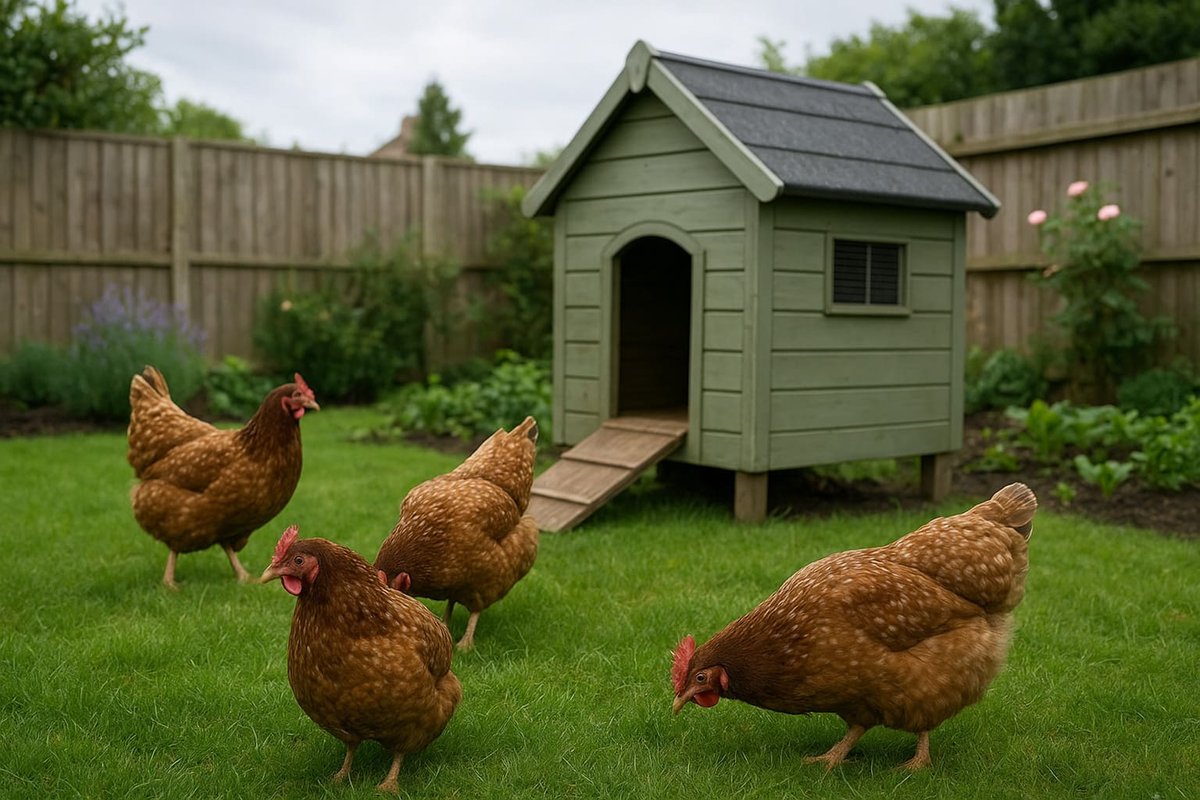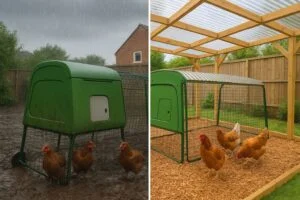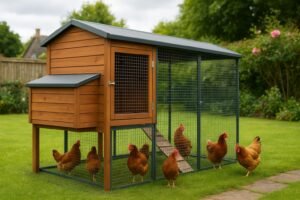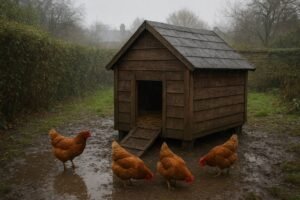Hello! Are you dreaming of collecting fresh eggs from your own garden? There is nothing quite like the feeling of walking out on a chilly morning to find a warm, freshly laid egg. Keeping chickens in the UK is a wonderful, rewarding hobby, and I’ve learned so much from my own little flock. It’s a joy to watch them potter about, and they bring so much life to the garden.
But when you first start, the rules can seem a bit much. You read conflicting information online, hear horror stories about bird flu, registration, and neighbours complaining. It’s easy to feel overwhelmed and put off before you’ve even bought a coop.
This guide is here to cut through the noise. I’ve written it for regular folks in the UK—whether you’ve got a small garden, an allotment, or even a council house. We’ll walk through all the important 2025 rules in simple, everyday English. No confusing jargon, just the facts you need to start your hobby with confidence.
I’ve double-checked everything with the latest 2025 info from official places like GOV.UK, DEFRA (that’s the Department for Environment, Food & Rural Affairs), and chicken welfare experts like the British Hen Welfare Trust (BHWT). This is a responsibility, but it’s a manageable one.
We’ll cover everything from the new registration rules to the laws on keeping chickens in back gardens UK, and even the “secret” to making sure you never attract rats. Ready to get started? First decide whether to start with chicks or adult hens—both have pros and cons for UK keepers. Let’s go!
What Are the New Rules for Keeping Chickens in the UK in 2025?
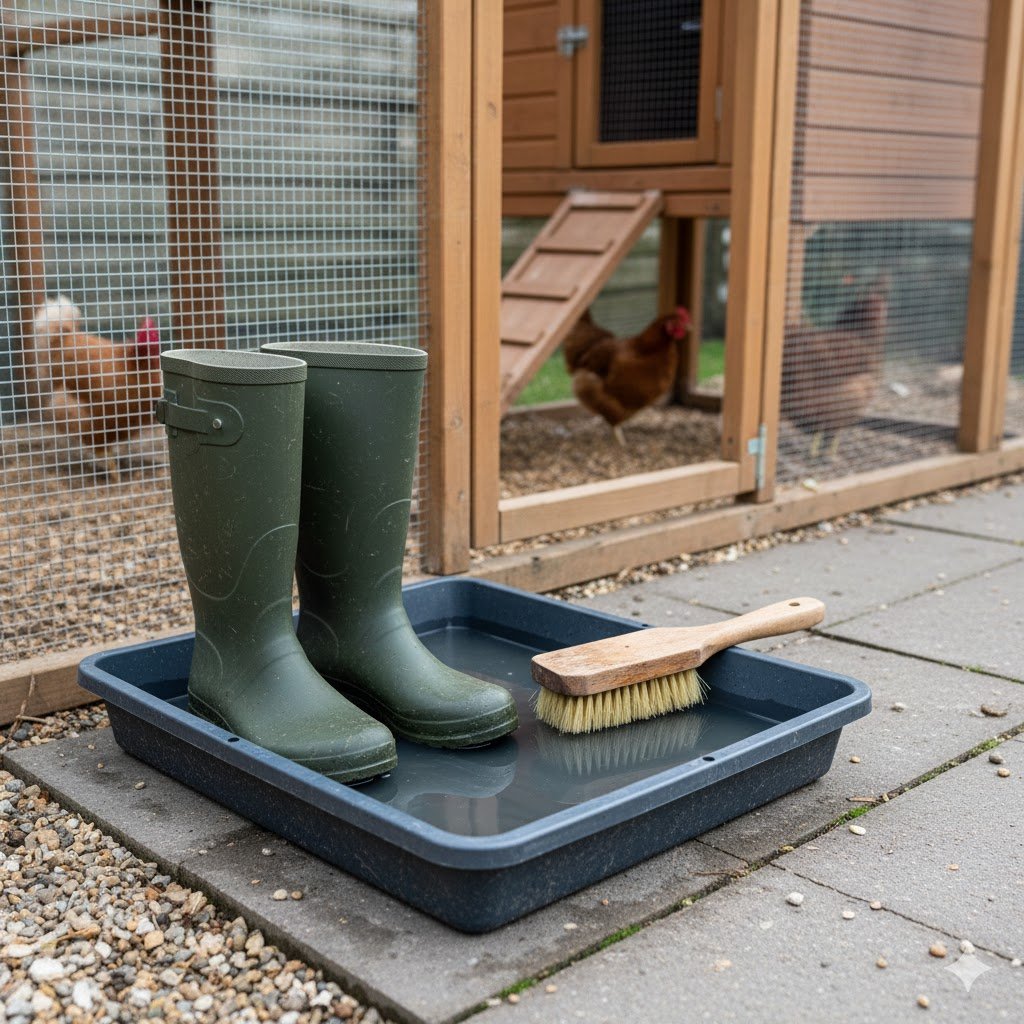
This is the first question most new keepers ask. The good news is, after a few busy years of rule changes, 2025 has been quite stable.
The biggest “new rule” actually happened on October 1, 2024, and it’s still the most important one: everyone who keeps even one bird must register with DEFRA. Before this, the rule was only for flocks of 50 or more, so this was a big change for backyard keepers. (We’ll cover how to do that in a minute).
But the best news for 2025? The mandatory “housing order” for bird flu was lifted.
- Bird Flu Housing Order Lifted (May 15, 2025): You might remember that for a while, all chickens had to be kept indoors or in a fully netted, covered run to protect them from avian flu. As of May 15, 2025, DEFRA lifted this rule for England. This means your hens can now enjoy your garden again, as long as it’s safe. (Wales, Scotland, and Northern Ireland often follow similar rules, but always check your nation’s specific GOV page as rules can differ).
- Biosecurity is STILL Law: “Biosecurity” is just a fancy word for “keeping things clean to stop disease.” Just because the housing order is lifted, it doesn’t mean the risk of avian flu is gone. All bird keepers in the UK (that’s you!) must still, by law, follow good biosecurity. This is non-negotiable and a key part of being a responsible owner. You can read the Official DEFRA guidance on avian influenza biosecurity to understand the latest advice.
A Practical Biosecurity Checklist for 2025
This isn’t just for big farms. These simple steps are the best way to protect your flock and are a legal requirement for all backyard poultry UK owners. For larger flocks or detailed planning, see our complete biosecurity plan guide.
- Clean Your Boots: Keep a separate pair of “chicken wellies” that you only wear in the chicken run. Keep a small bucket of DEFRA-approved disinfectant (like Virkon S) outside the run to dip your boots in before and after you go in. This stops you from treading in disease.
- Move Feeders and Waterers: All food and water must be inside the run, preferably under cover. Placing them in the open garden is a free buffet for wild birds (like pigeons and starlings) who can carry disease.
- Net Your Run: While you don’t have to keep your hens inside a coop, their main run area should ideally be covered with netting on top. This stops wild birds from landing inside and pooping in their area.
- Quarantine New Birds: If you get new hens, you must keep them completely separate from your existing flock for at least 2-3 weeks. This gives you time to spot any signs of illness before it can spread.
- Clean and Disinfect: Regularly clean feeders, waterers, and touchpoints with a poultry-safe disinfectant.
- Fence Off Ponds: If you live near a pond or lake, keep your chickens fenced away from it. Wild ducks and geese are high-risk carriers of avian flu.
Key Takeaway
The main “new” rules for 2025 are:
- Registration: Still mandatory for everyone (even with 1 bird).
- Housing Order: Lifted on May 15, 2025. Your hens can go outside again.
- Biosecurity: Still a legal must. Keep things clean, cover your run, and move feeders indoors to protect your flock.
What Are the Rules for Keeping Chickens in DEFRA? / DEFRA Rules on Keeping ChickSens
When people talk about DEFRA rules on keeping chickens, they usually mean two things: registration (which we’ll get to next) and animal welfare.
Your main legal duty as a keeper comes from the Animal Welfare Act 2006 (official legislation). This law says you must give your chickens what they need to be healthy and happy. It’s not just a suggestion; it’s the law. It’s often broken down into the “Five Freedoms.”
Let’s look at what these mean in real, practical terms for a backyard keeper.
1. Freedom from Hunger and Thirst
This means constant access to fresh, clean water and the right type of chicken feed.
- Water: A chicken can drink up to 500ml of water a day (more in summer!). You must use a proper poultry drinker (not just a bowl they can poop in) and check it twice a day.
- Feed: Hens that are laying eggs need “layers pellets” or “layers mash.” This has the right balance of protein and calcium for them to stay healthy and form eggshells. Just feeding them mixed corn is not enough; corn is a treat, like giving a child only biscuits.
2. A Suitable Environment
This means a safe, dry, and draught-free coop and a secure run.
- The Coop: It must be waterproof and have ventilation (holes near the roof) but no draughts at perch level.
- Space: They need enough space to move around. A good rule of thumb is at least 30cm of perch space per bird inside the coop and at least 1 square metre of run space per bird at a minimum. For detailed space planning, see our guide on how much space chickens really need. More is always better.
- Protection: The coop must be safe from predators (like foxes). Check out our reviews of the best fox-proof chicken coops in the UK.
3. Freedom to Express Normal Behaviour
This is a big one. Chickens aren’t just egg-machines; they are complex birds. They need to be able to do “chicken things.”
- Foraging: Scratching at the ground. This is why a bare mud run is so sad. Give them a patch of soil, some woodchips, or even a pile of leaves to scratch through.
- Dust Bathing: This is how they wash. They must have a patch of dry, crumbly soil or sand (you can put this in a cat litter tray or old tyre) to fluff up in. This is essential for controlling mites. If you get an infestation, read our UK guide on getting rid of red mites in wooden coops.
- Perching: Chickens feel safe sleeping up high. Your coop must have rounded-edge perches for them to roost on at night.
4. Freedom to be Housed With (or Apart from) Other Animals
Chickens are flock birds. They get lonely and stressed on their own. You should never keep a single chicken. A flock of three is the best minimum number. This also means you must protect them from being bullied by other pets, like a boisterous dog.
5. Freedom from Pain, Suffering, Injury, and Disease
You must check your chickens every day. Watch them. Do they all run out for treats? Is one sitting puffed-up in a corner? You are legally responsible for spotting illness and getting them care. Learn how to do a proper chicken health check in under 5 minutes. This can mean contacting a vet. (Note: Not all vets treat chickens, so it’s a good idea to find a local “poultry vet” before you have a problem). This also includes your legal duty to follow biosecurity measures to prevent avian flu.
Here’s a simple breakdown of your main legal duties:
| Your Legal Duty | What It Means in Simple Terms | Official Source |
|---|---|---|
| Welfare | You must provide food, water, shelter, space, and vet care. | Animal Welfare Act 2006 |
| Registration | You must register your flock (even 1 bird) with the APHA (part of DEFRA). | Poultry Registration Regulations 2024 |
| Biosecurity | You must take steps to stop diseases (like avian flu) from spreading. | Avian Influenza (Preventive Measures) Regulations |
| Feeding | You must not feed them kitchen scraps. | Animal By-Products Regulations |
The RSPCA guidance on keeping chickens as pets and the BHWT (British Hen Welfare Trust) also have fantastic, easy-to-read guides on hen welfare UK that give great practical tips.
Key Takeaway
Your main job under DEFRA’s rules is to follow the Animal Welfare Act 2006. This means giving your chickens proper food, water, a safe coop, and the space and freedom to act like chickens.
Do I Have to Register My Chickens with DEFRA? How to Do It Online

This is the big one. The answer is short and simple: Yes, you do.
Before October 2024, you only had to register if you had 50 or more birds. This has now changed.
How many chickens can you have without registering?
In 2025, you can’t have any chickens without registering. The limit is zero.
The rule is: If you keep one or more poultry birds in the UK, you must register them. This includes pet chickens, “rescue” hens, ducks, geese, and quail. This applies to you even if you just have two hens in a small Eglu coop in your garden.
Why do I have to register my chickens UK?
It’s all about disease control. When there’s an outbreak of a serious disease like avian flu, the APHA (Animal and Plant Health Agency), which is part of DEFRA, needs to know where all the birds are. This lets them contact you quickly with alerts, biosecurity rules, or to check for disease.
This isn’t about “spying” on pet owners. It’s to create a map to stop a disease from wiping out flocks, including your own. It’s the single best way to protect all birds, and it’s your part of the national effort.
How to Defra Register Chickens (UK Poultry Register Online)
Don’t worry, this is not a test, and it’s surprisingly easy.
- It is 100% FREE if you have fewer than 50 birds.
- It takes about 10 minutes online.
Here are the steps for keepers in England, Scotland, and Wales:
- Go to the official GOV.UK website. You can search for “register poultry” or use the direct link to the official GOV.UK poultry register.
- Fill out the online form. You’ll need:
- Your name and address.
- The location where you keep the birds (if it’s different, like an allotment).
- The species you keep (e.g., chickens).
- How many you have (a rough idea is fine).
- Why you keep them (e.g., “as pets” or “for eggs for the family”).
- Submit the form. You’ll get a confirmation and a registration number, which is often called a CPH number (County Parish Holding). This number is just a code for the land where the birds are kept. Keep this number safe.
- Update it. This is the other new part of the rule. You must review and update your details once a year. This is just to confirm you still have birds (or not). They will send you a reminder.
For keepers in Northern Ireland: The rules are the same (register even one bird), but you register with DAERA (Department of Agriculture, Environment and Rural Affairs) instead.
Once you’ve registered, avoid these common mistakes new chicken keepers make that can lead to problems down the line.
What if I don’t register?
If you don’t register, you could be fined. The government takes this very seriously, with fines running up to £5,000. But more importantly, you’d be putting your flock and your neighbours’ flocks at risk. You won’t receive the vital disease alerts that tell you when to take emergency precautions. It’s free and easy, so it’s not worth the risk.
Key Takeaway
Yes, you must register your chickens with DEFRA, even if you only have one. It’s free, takes 10 minutes on the GOV.UK website, and is a legal requirement to help stop bird flu. You must also update your details once a year.
Laws on Keeping Chickens in Back Gardens UK / How Many Chickens Can I Keep in My Backyard?
So, you’re all set to register. Now, how many hens can you actually fit in your garden?
How many chickens can you keep in a residential area in the UK?
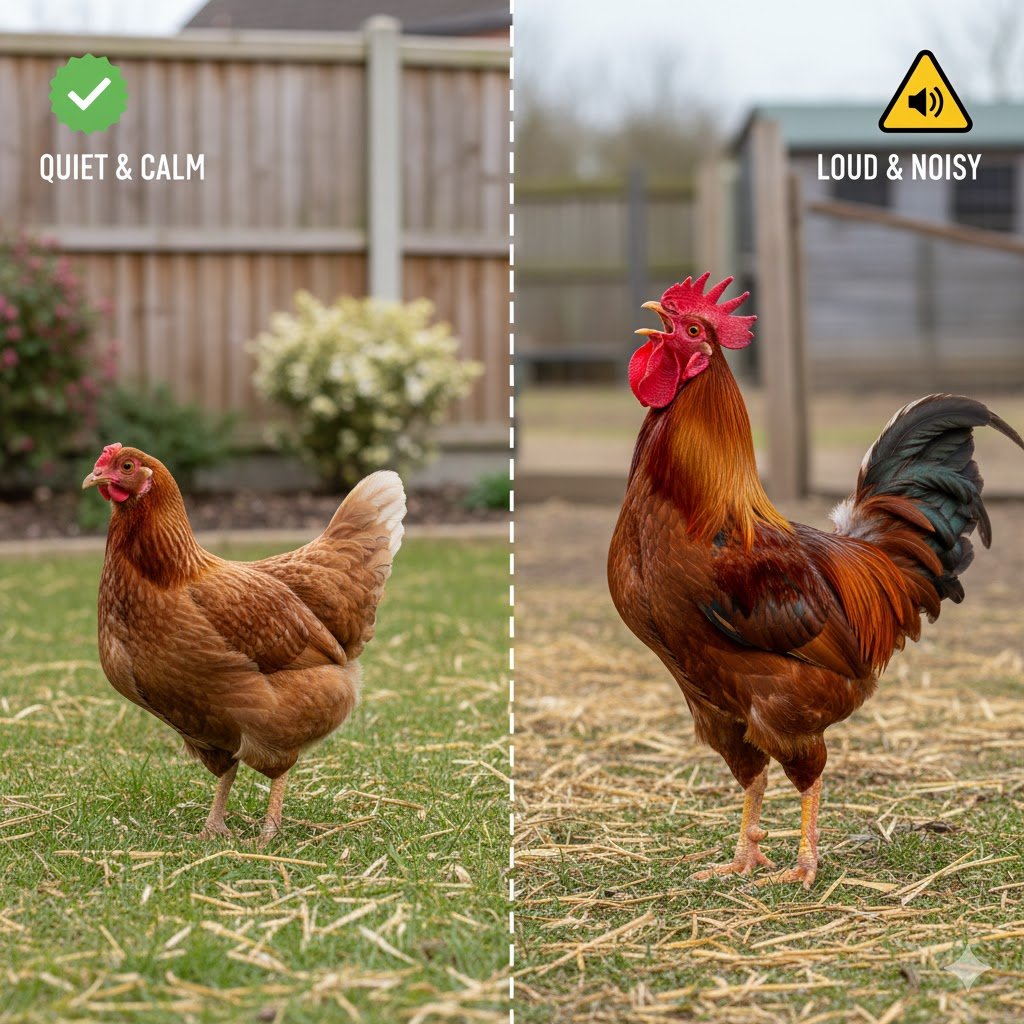
This surprises many people: there is no national law in the UK that sets a limit on the number of chickens you can keep.
However, that doesn’t mean you can start a farm. Your limit is set by three other, much more important, things:
- Council Rules (Nuisance Laws): This is the most important one. You can’t cause a “statutory nuisance.” This is a legal term from the Environmental Protection Act 1990. It means your chickens can’t cause bad smells, attract pests (like rats), or make unreasonable noise. Many councils, like those in East Suffolk or Bassetlaw, have guides that strongly advise against cockerels and link problems directly to over-stocking and poor cleaning.
- Property Deeds (Covenants): Check the deeds to your house (the legal documents you got when you bought it). Some properties, especially newer housing estates, have rules called “restrictive covenants” that ban keeping livestock. This is a private rule tied to the house, and it overrules the council. Even if the council says it’s fine, a covenant could stop you.
- Animal Welfare: You must have enough space for the number of birds you keep (as we covered in the “Five Freedoms”). A tiny garden with 10 hens is a welfare and nuisance nightmare waiting to happen.
So, what’s a sensible number?
For a typical small-to-medium UK back garden, most keepers find that 3 to 6 hens is a happy, manageable number. This gives you plenty of eggs (a good hen lays 5-6 a week in her prime) and is easy to keep clean. Learn more about how many chickens you need for your family size to get the right number of eggs.
The golden rule is: DO NOT GET A COCKEREL (ROOSTER).
Hens are very quiet. They cluck gently. A cockerel, on the other hand, will crow loudly at all hours, starting before dawn. This is the number one reason for neighbour complaints and will almost certainly get you into trouble with the council. You don’t need one for your hens to lay eggs. To be an ideal neighbour, you can even choose from the quietest chicken breeds for backyards.
Key Takeaway
There is no national law on how many chickens you can keep. But your “real” limit is set by your council (nuisance laws) and your property deeds. For most, a small flock (3-6 hens) is best. And never keep a cockerel in a residential area.
Can I Keep Chickens in a Council House in the UK?
This is a great question, as many council tenants would love to keep a few hens.
Just like with garden-keepers, there is no single, UK-wide ban on keeping chickens in a council house or housing association property. It all comes down to your landlord.
You MUST check your tenancy agreement.
Your tenancy agreement is your contract with the council or housing association. It will have a section on pets or animals.
- If it clearly says “no poultry” or “no livestock,” then I’m afraid the answer is no.
- If it’s unclear or doesn’t mention it, you must contact your housing officer and get written permission before you buy any birds.
They will want to know:
- How many you plan to keep (again, 3-4 is a sensible number to ask for).
- Where you will put the coop.
- How you will keep it clean and stop rats.
As tenancy experts at Shelter UK advise, always get permission in writing. A verbal ‘yes’ from a housing officer who leaves their job is no help to you. You need a paper or email trail.
What About Keeping Chickens on an Allotment?
This is a very common place to keep chickens. The rules are set by whoever owns the allotment, which is usually the local council or a private allotment association.
- Check your allotment agreement.
- Most will have clear rules: cockerels are almost always banned.
- There is often a maximum number of hens (e.g., 5 or 10).
- There will be strict rules on coop cleanliness and pest control.
Key Takeaway
You might be able to keep chickens in a council house or on an allotment, but there’s no guarantee. You must read your tenancy agreement or allotment rules and get written permission from your council or housing officer first.
Why Is It Illegal to Feed Chickens Kitchen Scraps in the UK?
This is the one rule that catches most new keepers by surprise. It feels natural to give your hens leftover pasta or bread crusts, right?
Do not do it. It is illegal.
The law is very strict: you cannot feed any kitchen waste to your chickens. This is not “outdated info”; it’s a critical biosecurity law that is still 100% in force in 2025.
Why is this the law?
This rule came in after the devastating Foot and Mouth Disease outbreak in 2001. According to APHA’s official guidance on the kitchen scraps ban, that outbreak was linked to pigs being fed illegal kitchen waste.
The risk is “cross-contamination.” Even if you only feed your hens vegetable peelings, those peelings might have been cut on a board that also had raw meat on it. This tiny risk is enough to spread catastrophic diseases. This law is in place to protect all farm animals in the UK. The fine for breaking this rule is huge (up to £5,000 or even prison).
Let’s be crystal clear:
FORBIDDEN FOODS (From your kitchen):
- Leftover vegetables
- Potato peelings
- Leftover salad
- Cooked pasta or rice
- Bread or toast crusts
- Meat or fish (absolutely not)
- Anything from your plate or that has been “in your kitchen”. The British Hen Welfare Trust guidance on feeding rules confirms this applies even to vegan households, as the risk is cross-contamination.
APPROVED TREATS (Not from your kitchen):
- Commercial Feed: Their main diet must be a proper, shop-bought chicken feed (layers pellets or mash). See our comparison of the best UK poultry feed brands for recommendations.
- Garden Greens: You can feed them greens from your garden (like weeds, kale, or cabbage) as long as they have never been in your kitchen.
- Shop-bought treats: A handful of mixed corn (in the afternoon), mealworms, or sunflower seeds are fine in moderation.
What about my compost bin? Officially, if your compost bin contains kitchen scraps, your chickens should not have access to it.
Key Takeaway
It is illegal to feed your chickens any food from your kitchen. This is to prevent serious animal diseases. Stick to proper commercial feed and approved treats that have not been in your kitchen.
When Can Chickens Be Let Out Again in the UK in 2025? / Can You Just Let Chickens Roam Free?
We’ve got two different questions here, so let’s answer both.
1. When can chickens be let out again in the UK in 2025?
As we covered in the “New Rules” section, the mandatory bird flu housing order was lifted on May 15, 2025.
This means you can let your chickens out of their coop and into their run or your garden. You no longer have to keep them fully netted in (though it’s still a good idea for protecting them from wild birds).
2. Can you just let chickens roam free?
This is a different question. Letting them “out” into your secure garden is fine. Letting them “roam free” (out of your garden, down the street, or onto your neighbour’s property) is not okay.
The Dangers and Nuisance of Free Roaming
- It’s a Nuisance: Your neighbours will not be happy when your hens dig up their prize-winning flowers, dust-bathe in their borders, or poo on their patio. This is a fast-track to a complaint to the council.
- It’s Dangerous (Predators): Foxes are the #1 predator, and they hunt in broad daylight, even in cities. Letting your hens roam is an open invitation.
- It’s Dangerous (Poisons): You have no idea what your neighbours are using in their garden. Slug pellets, rat poison, and certain fertilisers are all deadly to chickens.
- It’s Your Responsibility: By law (Animal Welfare Act and nuisance laws), you are responsible for keeping your animals on your own property and safe from harm.
What Does “Safe Ranging” Look Like?
Safe ranging means letting them out in an area that is securely fenced. For chickens, this means a fence that is:
- At least 6ft (1.8m) high to stop them from flying over.
- Dug into the ground at least 1ft (30cm) or has a wire “skirt” pegged flat on the ground pointing outwards. This is to stop predators from digging under.
A dedicated, large, walk-in run (often with a net roof) is the best and safest solution for most people.
Key Takeaway
Your hens can be let out into your garden (since May 15, 2025). But you cannot let them roam free outside your property. You must keep them in a securely fenced, predator-proof area.
Common Problems with Keeping Chickens UK: Will I Get Rats If I Keep Chickens? Are Chickens Noisy for Neighbours?
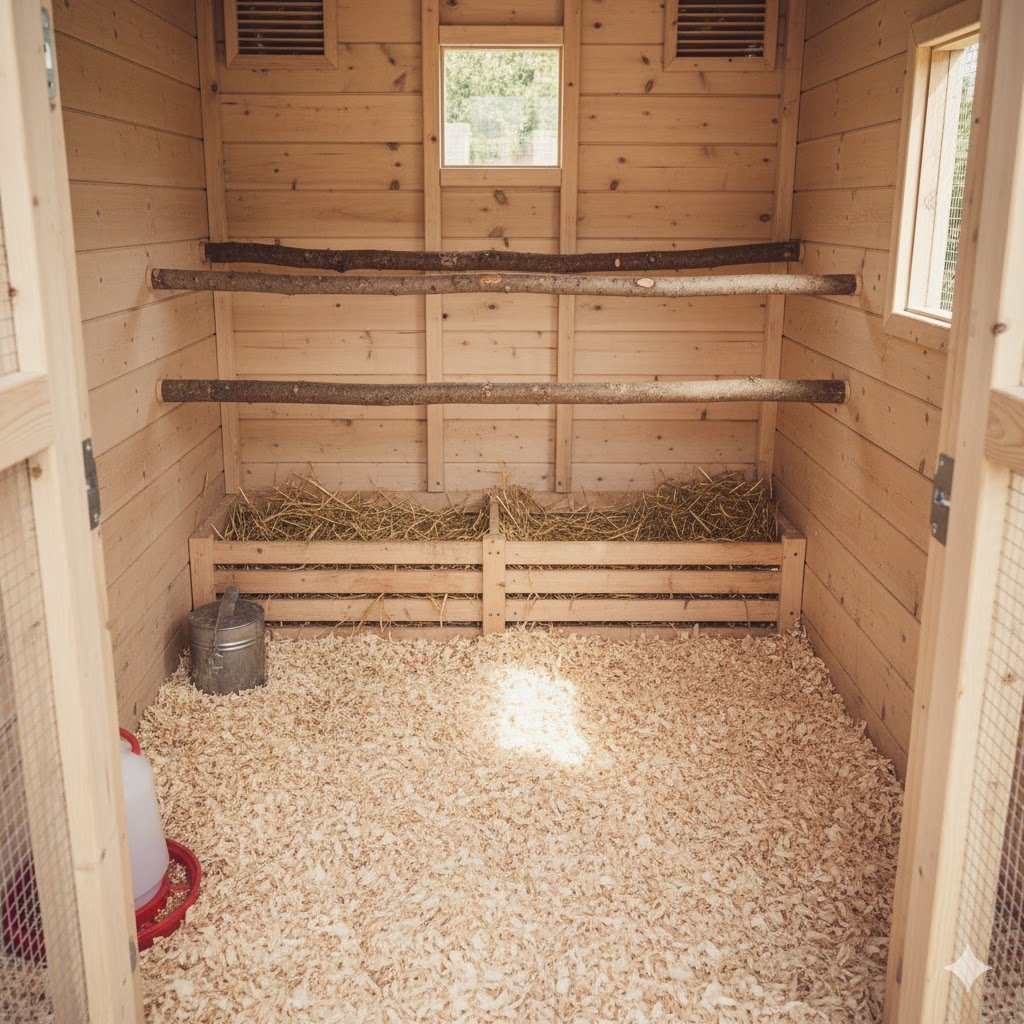
Let’s be honest. As a keeper, I can tell you that things can go wrong. These are the “big three” problems and how to solve them before they start.
“Will I get rats if I keep chickens?” (Pest Control)
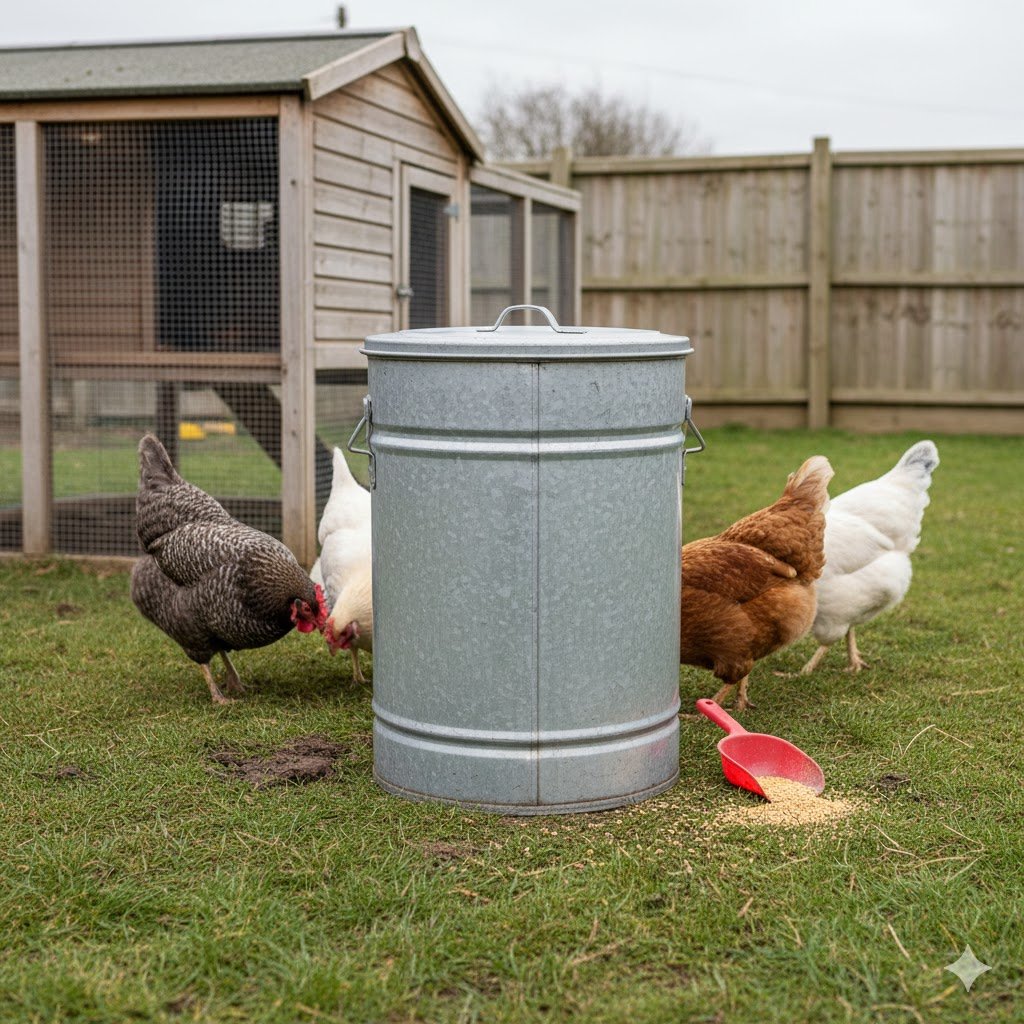
Chickens themselves do not attract rats. Their food does.
Rats will turn up if you give them an easy, reliable, all-you-can-eat buffet. If you just scatter food on the ground or leave your feeder out overnight, you are basically sending them an invitation. This is the #1 mistake new keepers make.
How to Prevent Rats: An Ultimate Checklist
- Store Feed Securely: This is mandatory. Store all your chicken feed in a metal bin with a secure-fitting lid. Do not use plastic bags or plastic bins; rats will chew straight through them.
- Get a Treadle Feeder: This is the best investment you will ever make. It’s a metal box that only opens when a chicken stands on the platform. Rats are too light to open it.
- Remove Food at Night: If you don’t have a treadle feeder, you must bring the feeders indoors every single night before dusk.
- Clean Up Spills: Do a quick check before dark and scoop up any spilled food.
- Collect Eggs Daily: Rats love to steal and eat eggs.
- Avoid Straw Floors: Do not use straw as flooring for the run. It gets wet and provides a perfect, warm nesting place for rats. Use woodchip instead.
Follow these quick tips, or read our comprehensive guide to keeping rats out of your chicken coop for advanced prevention strategies.
“Are chickens noisy for neighbours?” (Noise Control)
Hens are not noisy. They make a lovely, gentle clucking sound, which is usually quieter than a barking dog. The one exception is the “egg song” – a 10-minute proud cackle a hen does after-laying-an-egg. It’s brief and normal.
Cockerels (roosters) ARE noisy. They crow very loudly, starting around 4 AM. This is the #1 cause of neighbour complaints chickens UK. Most councils will class a cockerel as a noise nuisance, and some ban them completely in residential areas.
Solution: Just keep hens. You don’t need a cockerel to get eggs.
“What about the smell?” (Smell Control)
A well-kept coop does not smell bad. It should smell earthy, like straw and wood shavings. A coop only smells bad if it’s left to get wet and dirty (from rain getting in) or if the droppings build up. UK weather means dampness is a constant challenge. Choose the best bedding for UK damp conditions to keep your coop healthy.
Solution:
- The “Poo Pick”: Do a quick “poo pick” every day. I use a cat litter scoop to get the worst of the droppings from the bedding. It takes 60 seconds.
- The “Full Clean”: How often you do a full clean (replacing all bedding) depends on your setup. A small coop with 3 hens might need it weekly.
- The “Deep Litter” Method: A great alternative for larger coops. You start with a deep (15cm) layer of wood shavings and “turn” it with a fork every few days, adding a fresh layer on top. The good bacteria break down the droppings, and it stays smell-free. You only clean it out once or twice a year.
- Ensure Good Ventilation: Good airflow (without draughts) is key to keeping the coop dry and fresh.
Key Takeaway
The main problems are 100% avoidable.
- Rats: Store feed in a metal bin and use a treadle feeder.
- Noise: Don’t get a cockerel.
- Smell: Keep the coop dry and clean it regularly.
Can I Report My Neighbour for Having Chickens?
What if you’re on the other side of the fence?
You cannot report your neighbour simply for owning chickens. If they are following the rules, keeping a few quiet hens, and their coop is clean, they are doing nothing wrong.
However, you can report them if their chicken-keeping is causing a “statutory nuisance.” This has a specific legal meaning. It usually covers:
- Smell: A strong, foul odour from a filthy coop that stops you from enjoying your own garden.
- Pests: A rat or fly infestation that is clearly coming from their property (e.g., from badly stored feed).
- Noise: Constant, loud noise. This almost always means they have a cockerel.
What to Do if Your Neighbour’s Chickens are a Problem
- Talk to them first. This is always the best step. They might not even be aware of the problem. Try to be friendly. “Hi, I’m not sure if you know, but your cockerel has been crowing at 4 AM, and it’s waking us up.”
- Keep a diary. If talking doesn’t work, your council’s Environmental Health team will ask for a log. Note down the dates and times of the nuisance (e.g., “Cockerel crowing: 4:15 AM – 5:30 AM, Oct 24th” or “Strong smell of ammonia: Oct 25th, 2 PM”).
- Contact the council. If the problem is a real nuisance and talking has failed, contact your local council’s Environmental Health Department. They are the only ones who can investigate a statutory nuisance.
Key Takeaway
You can’t report someone just for having chickens. But if the birds are causing a real problem with smell, rats, or noise (from a cockerel), talk to your neighbour first, then contact your council’s Environmental Health team.
What Other UK Keepers Say (Social Proof)
Don’t just take my word for it. Following these simple rules really does make life easier. Here’s what some other small flock keepers from around the UK have said:
“I was really worried about registration, thought it would be a nightmare. I followed the link in this guide, and it honestly took me five minutes on the GOV.UK site. Such a relief! Now I know I’m all legal.” — Sarah, allotment keeper in Manchester
“My neighbour was complaining about rats before I even got my hens! I followed the advice here to the letter: metal feed bin, no food left out. Six months on, we’ve not seen a single rat, and my neighbour is happy (and even takes the odd egg!).” — David, backyard keeper in East Suffolk
“As a council tenant, I was 99% sure I wouldn’t be allowed hens. But this guide pushed me to actually ask for permission instead of just assuming. I sent my housing officer my plan (3 hens, secure coop, clean-up rota) and they approved it in writing! My kids are overjoyed.” — Chloe, council tenant in Wales
Final Thoughts: Are Chickens Worth the Rules?
Absolutely, yes!
Keeping chickens in the UK is an amazing hobby. The rules might seem a lot to take in, but they are all very simple and based on common sense.
It all boils down to this:
- Register: Register your hens on the GOV.UK site. It’s free and it’s the law.
- Be Clean: Follow biosecurity, keep the coop clean, and store food in a metal bin.
- Be a Good Neighbour: Don’t get a cockerel, and make sure your hens stay in your garden.
If you do those three things, you’ll have a happy, healthy flock and wonderful fresh eggs for years to come.
Your next steps are to make sure you have the right setup and the right birds. Check out our follow-up guides on “Building a Fox-Proof Coop in the UK” and “The Best Chicken Breeds for UK Gardens.” For even more great advice, check out the British Hen Welfare Trust’s complete guide to keeping chickens as pets.
FAQ on Keeping Chickens in the UK
What about bird flu in the UK in 2025?
The risk is lower, and the housing order was lifted on May 15, 2025. But you must still follow biosecurity (keep things clean) to protect your flock.
What is the UK poultry register online?
This is the official GOV.UK website where all keepers must register their birds (even if you just have one). It’s free for small flocks.
Do I have to register my chickens UK?
Yes. As of 2025, it is a legal requirement to register even one chicken.
Are my rescue hens noisy for neighbours?
Hens are very quiet! As long as you don’t have a cockerel (rooster), noise should not be a problem. The short “egg song” they sing after laying is normal and brief.
Do I need planning permission for a chicken coop?
Usually, no. In most of the UK, a chicken coop is a ‘temporary’ structure. As long as it’s for your own use (not a business), is under 2.5 metres high, and isn’t placed in your front garden, it’s typically covered by ‘permitted development’ rules. However, if you live in a listed building or want to build a very large, permanent structure, you should always check your local council’s planning portal first.

Oladepo Babatunde is the founder of ChickenStarter.com. He is a backyard chicken keeper and educator who specializes in helping beginners raise healthy flocks, particularly in warm climates. His expertise comes from years of hands-on experience building coops, treating common chicken ailments, and solving flock management issues. His own happy hens are a testament to his methods, laying 25-30 eggs weekly.
